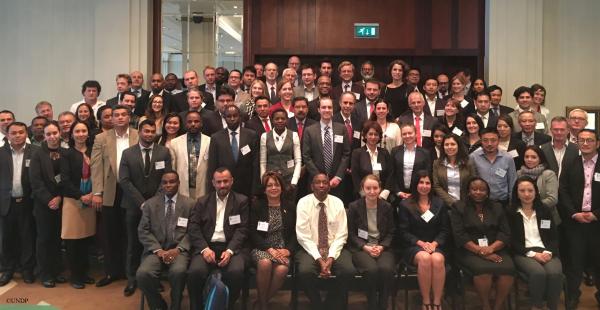
Dialogue on operationalising NDCs
Many countries are currently focused on determining how they can achieve national implementation of the Paris Agreement and the goals that they have set out within their (Intended) Nationally Determined Contributions ((I)NDCs). A number of events have already been held in order to promote dialogue on this issue, including several workshops and conferences by the International Partnership for Mitigation and MRV and its cooperation partners. More events are planned for the coming months.
Partnership Meeting, regional workshops and Annual Partnership Retreat
The Paris resolutions and the submitted (I)NDCs currently have a strong influence in shaping the work in the Partnership’s regional groups. Accordingly, the most recent workshop of the Anglophone African Regional Group as well as the Cluster Francophone addressed how INDCs can be translated into action plans and what role Nationally Appropriate Mitigation Actions (NAMAs) will play in this regard. The two workshops were held in cooperation with the United Nations Development Programme (UNDP) and the Secretariat of the United Nations Framework Convention on Climate Change (UNFCCC).
The next two workshops for Latin America and the Caribbean (19 – 21 July 2016 in San Jose, Costa Rica; in cooperation with the UNFCCC Secretariat and UNDP) and Asia-Pacific (26-27 July 2016 in Hanoi, Viet Nam) will also address operationalising (I)NDCs.
During the partnership meeting on 22 May 2016 in Bonn, more than 60 country representatives as well as participants from international organisations discussed how the Partnership will address the topics (I)NDC implementation and transparency in future, therefore providing important strategic guidance.
Additionally, the Annual Partnership Retreat 2016, which will take place in Cape Town, South Africa from 31 August – 7 September 2016, will specifically focus on the Enhanced Transparency Framework within the context of NDC implementation.
UNDP Global Workshop and Regional Dialogues on NDCs
On 13 and 14 June 2016, UNDP gathered over 100 participants in Brussels, Belgium for a Global Workshop on Nationally Determined Contributions (NDCs). The participants represented over 40 countries, as well as a number of UN agencies, financial institutions, and other organisations involved in preparing countries for NDC implementation.
Over the course of the two-day workshop, participants discussed technical and institutional issues related to NDC implementation in the context of the Paris Agreement and exchanged initial country experiences in planning for this process. They also discussed the opportunity of NDC implementation to contribute to achieving the Sustainable Development Goals and the need for long-term planning to achieve a zero-carbon future.
Key takeaways included the importance of strong institutional coordination and stakeholder engagement; the need to embed NDC implementation plans into national development plans and long-term strategies; the opportunity to build on existing work and processes (e.g., NAMAs, NAPs, monitoring/reporting efforts, etc.); and the need to think holistically in developing NDC funding strategies (assessing national budgets, catalyzing private investment, and attracting international support).
Building on the Brussels workshop and previous INDC dialogues held in 2014-2015, UNDP is currently in the process of organising four regional dialogues on NDCs. These dialogues are intended to support countries in the process of preparing for NDC implementation and provide a forum for exchanging experiences and lessons learned between countries.
The first of these dialogues takes place in Costa Rica 19 – 21 July, co-organized with the UNFCCC Secretariat, the International Partnership for Mitigation and MRV, and the Partnership for Market Readiness (see above). Similar regional dialogues will be organised for countries in Africa (week of 5 September; in Tunisia), Asia & Eastern Europe (week of 3 October), and the Pacific (week of 10 October). The series of dialogues is co-organised with the UNFCCC Secretariat and will also be coordinated closely with the International Partnership on Mitigation and MRV.

